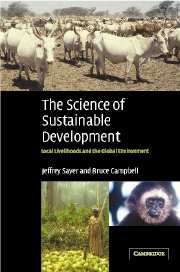Book contents
- Frontmatter
- Contents
- List of figures
- List of boxes
- List of tables
- Foreword
- Preface
- Acknowledgements
- Part I Integrating natural resource management
- Part II Realities on the ground
- Part III The research–management continuum
- 9 The spread of innovations
- 10 Measuring the performance of natural resource systems
- 11 Achieving research-based management
- Bibliography
- Index
11 - Achieving research-based management
Published online by Cambridge University Press: 18 May 2010
- Frontmatter
- Contents
- List of figures
- List of boxes
- List of tables
- Foreword
- Preface
- Acknowledgements
- Part I Integrating natural resource management
- Part II Realities on the ground
- Part III The research–management continuum
- 9 The spread of innovations
- 10 Measuring the performance of natural resource systems
- 11 Achieving research-based management
- Bibliography
- Index
Summary
Science alone will not solve the problems of natural resource management. However, science has a role to play and there is an urgent need to strengthen the scientific basis for practical management programmes. Yet the potential for science-based management will not be realised simply by investing more resources in conventional research structures and approaches. On-station research that delivers fully fashioned products to be made available ‘to whom it may concern’ and that proceeds independently of day-to-day resource management has to be relegated to history. Richard Bell, a researcher-turned-manager who worked for many years in conservation programmes in southern Africa, pointed out that much natural resource management always has proceeded without the benefit of formal research. Research is expensive in time, money, equipment and trained personnel. Resources are limited – is research, therefore, really necessary? Bell's reply is that it is, but only under a new definition of the role of research. This role is to improve the understanding of the complex ecological, economic and social systems in which natural resource management operates. This, claims Bell, will allow management agencies to achieve their objectives more effectively. Research, in Bell's view, must become part of management. Yet focussing research efforts solely on those areas known to be of interest to management – biological inventories for example – may exclude scientific applications with potentially high pay-offs.
- Type
- Chapter
- Information
- The Science of Sustainable DevelopmentLocal Livelihoods and the Global Environment, pp. 226 - 247Publisher: Cambridge University PressPrint publication year: 2003



